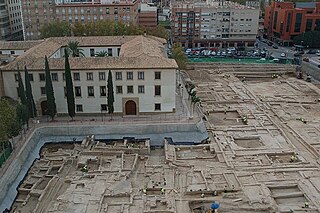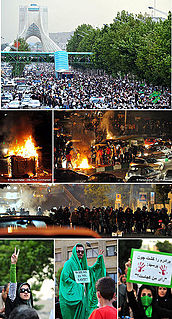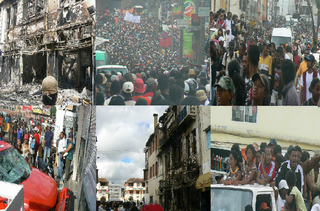 W
WThe 517 Protest was a protest that took place on 17 May 2009 in Taipei and Kaohsiung, Taiwan. The event vented anger at President Ma Ying-jeou for China-friendly policies that were seen as compromising Taiwan's sovereignty.
 W
WThe Al-Andalusian palatial complex and neighborhood of San Esteban is an archaeological site that was in the Arrabal de la Arrixaca Nueva, now in the center of Murcia. This exceptional archaeological site of 10,143 square metres is located in the old Garden of San Esteban, next to the building Palacio de San Esteban. It is allowing archaeologists to document the evolution of this urban space from Islamic times to the present, although the excavation process is still unfinished and, as yet, missing archaeological data for its final evaluation. The site is the remains of large country residences, palaces, extensive gardens, and a religious sector with a necropolis and an oratory or small mosque.
 W
WThe Ashura protests were a series of protests which occurred on 27 December 2009 in Iran against the outcome of the June 2009 Iranian presidential election, which demonstrators claim was rigged. The demonstrations were part of the 2009 Iranian election protests and were the largest since June. In December 2009, the protests saw an escalation in violence.
 W
WThe 2009 G20 London summit protests occurred in the days around the 2 April 2009 G20 London summit. The summit was the focus of protests from a number of groups over various long-standing and topical issues. These ranged from disquiet over economic policy, anger at the banking system and bankers' remuneration and bonuses, the continued war on terror and concerns over climate change.
 W
WIn 2009, a mass rally by a coalition of opposition parties in took place in Georgia against the government of President Mikheil Saakashvili. Thousands of people demonstrated, mainly in the capital, Tbilisi, starting on 9 April 2009, demanding Saakashvili's resignation. On the first day of demonstrations, up to 40,000 people gathered in Tbilisi. Opposition activists had expected some 100,000 – 150,000 participants. Protests continued for over three months, although fewer people participated as time passed than during the first days. On 26 May 2009, the Georgian Independence Day, 60,000 protesters took part. Although peaceful at first, there were incidents of fighting between the Georgian police and protesters. The daily rallies gradually dwindled and ended, without achieving any tangible results, on 24 July –107 days after they kicked off.
 W
WThe 2009–2011 Icelandic financial crisis protests, also referred to as the Kitchenware, Kitchen Implement or Pots and Pans Revolution, occurred in the wake of the Icelandic financial crisis. There had been regular and growing protests since October 2008 against the Icelandic government's handling of the financial crisis. The protests intensified on 20 January 2009 with thousands of people protesting at the parliament (Althing) in Reykjavík. These were at the time the largest protests in Icelandic history.
 W
WProtests against the results of the highly controversial 2009 Iranian presidential election, a disputed victory by President Mahmoud Ahmadinejad, in support of opposition candidates Mir-Hossein Mousavi and Mehdi Karroubi, occurred in major cities nationwide from 2009 into early 2010. The protests were titled the Iranian Green Movement by its proponents, reflecting Mousavi's campaign theme, and Persian Awakening, Persian Spring or Green Revolution, reflecting the "Persian identity" of Iranians and the so-called "colour revolution" theme.
 W
WThe anti-austerity movement in Ireland saw major demonstrations from 2008 to 2015.
 W
WThe 2009 Malagasy political crisis began on 26 January 2009 with the political opposition movement led by Antananarivo mayor Andry Rajoelina, which sought to oust President Marc Ravalomanana from the presidency. The crisis reached its climax in the 2009 Malagasy coup d'état when Andry Rajoelina was declared the president of the High Transitional Authority of Madagascar on 21 March 2009, five days after Ravalomanana transferred his power to a military council and fled to South Africa.
 W
WProtests against the April 2009 Moldovan parliamentary election results began on 6 April 2009 in major cities of Moldova before the final official results were announced. The demonstrators claimed that the elections, which saw the governing Party of Communists of the Republic of Moldova (PCRM) win a majority of seats, were fraudulent, and alternatively demanded a recount, a new election, or resignation of the government. Similar demonstrations took place in other major Moldovan cities, including the country's second largest, Bălți, where over 7,000 people protested.
 W
WThe National Equality March was a national political rally that occurred October 11, 2009 in Washington, D.C. It called for equal protection for lesbian, gay, bisexual, and transgender (LGBT) people in all matters governed by civil law in all 50 states and the District of Columbia. The march was called for by activist David Mixner and implemented by Cleve Jones, and organized by Equality Across America and the Courage Campaign. Kip Williams and Robin McGehee served as co-directors. Leaders like actress Michelle Clunie, Courage Campaign marketing director, Billy Pollina and New York gubernatorial aide Peter Yacobellis hosted the first fundraiser in the spring of 2009. This was the first national march in Washington, D.C. for LGBT rights since the 2000 Millennium March.
 W
WProtests in Canada against the Sri Lankan Civil War, often referred to as the Tamil protests by the media, consisted of a series of demonstrations which took place in major Canadian cities with a significant Tamil diaspora population during the year 2009 protesting the alleged genocide of Sri Lankan Tamil people in the Northern Province and Eastern Province of the island nation Sri Lanka. It was part of a global outcry by the Tamil diaspora to end the Sri Lankan Civil War, investigate acts of war crimes by the Government of Sri Lanka, and restore civil rights for Tamils in Sri Lanka. The aim was also to create awareness and appeal to leaders, notably the Prime Minister of Canada, Stephen Harper, the President of the United States, Barack Obama and the Consulate General of Sri Lanka in Canada, Bandula Jayasekara, to take action in ending the conflict. Several Tamil Canadian citizens and business-owners from different parts of Canada and the United States took part in major protests set up in Toronto and Ottawa, while smaller scale demonstrations took place in Montreal, Vancouver and Calgary.
 W
WIn the wake of student protests in Austria since the end of October 2009 against restrictions on the access to higher education, many Austrian universities' lecture halls and rooms were occupied, including the two largest auditoriums in Austria at the University of Vienna.
 W
WThe Taxpayer March on Washington was a Tea Party protest march from Freedom Plaza to the United States Capitol held on September 12, 2009, in Washington, D.C. The event coincided with similar protests organized in various cities across the nation. The protesters rallied against what they consider big government, the dismantling of free market capitalism, abortion, and President Barack Obama's proposals on health care reform, taxation, and federal spending, among other issues.
 W
WThe Tea Party protests were a series of protests throughout the United States that began in early 2009. The protests were part of the larger political Tea Party movement. Most Tea Party activities have since been focused on opposing efforts of the Obama Administration, and on recruiting, nominating, and supporting candidates for state and national elections. The name "Tea Party" is a reference to the Boston Tea Party, whose principal aim was to protest taxation without representation. Tea Party protests evoked images, slogans and themes from the American Revolution, such as tri-corner hats and yellow Gadsden "Don't Tread on Me" flags. The letters T-E-A have been used by some protesters to form the backronym "Taxed Enough Already".
 W
WThis article is about the university strike movement in France during 2007 and 2009. Since Valérie Pécresse was appointed Minister for Higher Education and Research, the mood had been tense in the French university system. Several reform projects had led to protest movements, including that of 2009, the longest-lasting yet since 1968, still on-going after several months. It had put a heavy strain on France's political environment, even within the leading UMP party, and led to a reconsideration of the Bologna process within intellectual circles. A similar movement has simultaneously taken place in Spain.